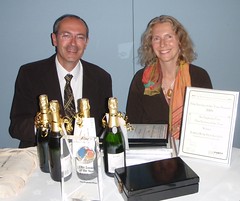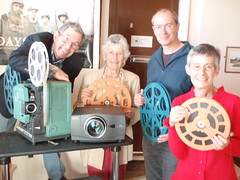Forest Row Film Society wins major national award

Forest Row Film Society scooped up several awards including Film Society of the Year at the prestigious annual ceremony organised by the British Federation of Film Societies (BFFS).
At the event in Sheffield on 19 September, the society also won awards for Best Programming, Best Marketing and Publicity, and Best Programme Notes.
Film Societies and community cinemas are a vibrant, but sometimes neglected part of the film exhibition network in the UK. There are hundreds of these volunteer-run organisation throughout the country showing a huge variety and diversity of films, often in locations far from a mainstream cinema.
Introducing the Film Society of the Year award, Donna Anton, chair of the BFFS, noted: “By merely looking at Forest Row Film Society’s programme, the judges could feel how much this organisation is excited by film and by the prospect of screening to its local community. The level of audience engagement in the programming of this organisation is nothing short of inspiring, ensuring that the best films find their way to this East Sussex village.”
She continued: “This year, one society stood out in the eyes of the judges. Their application was an excellent, thoughtful piece of work that truly reflected the thoughtful nature of this special organisation.”
Brad Scott of FRFS said “The BFFS awards are very important since they demonstrate how active community cinemas are, and give us a great opportunity to learn more from other people and deliver even better film experiences to our local areas.”
“The goal is to provide a friendly experience, giving people the chance to see some films that they might not otherwise see, as well as some old favourites and classics.”
“We work hard to develop a sense of community engagement with what we’re doing, whether through the social side, word of mouth, and tea and cake, or via the web, Facebook and Twitter.”
Founded in 1978 and screening in the village hall, FRFS has mostly shown world cinema, though it has broadened its programming in recent years. It was on the verge of closure a few years ago as 16mm prints became harder to source and the audience had declined.
Then, after working with Andrew Youdell at the British Film Institute, the East Sussex-based society was able to find an interesting and exciting range of 16mm films to extend its programme, and then a year ago was awarded some £12,000 in grants which enabled the purchase of a new digital projector, large screen and new sound system.
“The new equipment has radically transformed us; we now have the opportunity to choose from a much wider range of films,” said FRFS chairman Robert Evans. “Thanks to all our funders and the grant bodies who have made all this possible.”
Singled out for special mention by the BFFS, last year the society worked with a group of young people to devise part of the programming. That included successful screenings of films such as Into the Wild and Todd Haynes’ remarkable film about Bob Dylan, I’m Not There.
“We have also included some matinees for younger children,” added treasurer Marie-Claire Thomson, “and will extend these in our new season, with The Fox and the Child, and the delightful French animation Kirikou and the Sorceress.”

Brad Scott and Jo Carder at the annual conference and awards of the British Federation of Film Societies
A highlight in recent years has been the inclusion of silent films with live music in the programme. “Most recently we had a packed house of about 200 people come to watch some silent Laurel and Hardy films,” said committee member Diana Comer, “it was a delight to hear such raucous laughter from everyone there, from small children right up to the older people in the village.”
“We expect another big crowd for our screening of Buster Keaton in Sherlock Jr on 3rd October.”
Keen to work with other local groups, FRFS has also developed a documentary programme with Transition Forest Row showing important films about environmental issues and planning for life without abundant resources, especially oil.
Mike Grenville of Transition Forest Row commented: “Having a community cinema in the village is extremely important; not only does it give us an opportunity to screen films using excellent equipment, but it actively contributes to the vibrant culture of Forest Row, and minimises car usage.”
Brad Scott concluded: “We’d like to thank the audience for all their support and ideas; the committee have done a tremendous job in sustaining the society for over 30 years. There’s still much more we could do, and we learnt much from other societies at the awards ceremony. If anyone is interested, or fancies getting involved, we’d love to hear from them.”







I recently attended my first screening at the FRFS. I was incredibly impressed with the presentation, film notes and brief introduction to, and backrgound of, the film, not to mention the lovely cake!
I will certainly be a regular attendee in the future and would like to offer my sincere congratulations to all involved in the society.
The BFFS press release is also available